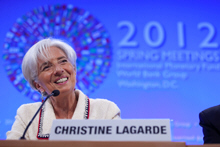
Typical street scene in Santa Ana, El Salvador. (Photo: iStock)
IMF Survey: Global Economy's 'Timid' Recovery Faces High Risks—Lagarde
April 19, 2012
- Collective action—a “Washington moment”—needed to keep crisis at bay
- Euro zone countries urged to implement announced reforms, deepen integration
- IMF firepower for economic stability expected to be significantly increased
The global economy has entered a “timid” recovery but still faces high risks, with some dark clouds on the horizon, IMF Managing Director Christine Lagarde said.

Lagarde: action taken in the last six months shows ‘significant determination’ to defend Europe’s common currency (IMF photo)
IMF-WORLD BANK SPRING MEETINGS
She told reporters at the 2012 IMF–World Bank Spring Meetings in Washington D.C. that collective action was needed on the part of global policymakers to address a range of challenges.
Lagarde said the euro zone is the epicenter of potential risk, but added that action taken during the last six months displayed significant determination to defend the common currency.
The dark clouds on the global economic horizon, Lagarde said, are sustained high unemployment in many corners of the world, not just the advanced economies; protracted slow growth; potential bank deleveraging; renewed financial stress in the euro area; and potential oil price hikes.
Collective action
Reiterating her call in an April12 speech for policymakers to seize a “Washington moment,” Lagarde said collective action is needed because all participants in the global economy have to address their own respective issues.
She noted that euro zone governments had adopted a “comprehensive package” of measures that included
• Action at national level, often with new governments
• The fiscal compact: better governance, more discipline, stronger sanctions
• Significant involvement of European institutions, in particular the European Central Bank, and
• The marked improvement of the European firewall.
Lagarde urged euro zone countries to implement announced reforms and deepen the integration of the zone at multiple levels.
But she stressed that other regions also needed to take policy action. Some emerging markets would need to refocus on their domestic growth,” not only based on investment but also drawing on consumption, which means significant, in-depth reforms at home.” Other emerging markets would need to properly manage capital flows, and accept the evolution of currencies as appropriate, Lagarde added.
Arab Spring countries would need support during their transitions, both in managing natural resources and in gaining global market access. Low-income countries could face lower aid flows and declining remittances, which would leave them less room for policy maneuver.
Global firewall
Lagarde said the IMF needs to participate in the international recovery effort by building additional firepower to promote global economic stability. “That is the reason why, as part of the outcome of these Meetings, we expect our firepower to be significantly increased.”
The IMF has been advocating the need to build a stronger global firewall of additional resources to contain any further financial crises. Pledges of financial support from IMF member countries currently total about $320 billion, with further progress expected during the Spring Meetings.
In addition to increased IMF firepower, Lagarde said she expected four specific outcomes from the Spring Meetings.
• Securing the additional funds for the Poverty Reduction and Growth Trust—the pooled resources from which the IMF draws concessional loans for low-income countries.
• Endorsing a better approach to multilateral surveillance that focuses on interconnectedness and spillovers.
• Making good progress toward completing reforms in the IMF’s quota resources and governance to better reflect the membership of the institution, and
• Ensuring that all ministers and governors attending the Spring Meetings go home with more energy and a clear understanding that everybody has work to do in cooperatively resolving global problems.
Responding to questions from reporters, Lagarde hailed Spain’s measures to strengthen its banking sector and reiterated that she welcomed the Chinese authorities’ move to widen the trading band of the renminbi, adding that the internationalization of the Chinese currency is a desirable goal.
Lagarde noted that the IMF was in the process of negotiating a program with the Egyptian authorities, and was seeking national political endorsement. “We are as focused on helping Egypt and other Arab Spring countries as we are on helping other members.” She said that while Jamaica’s program had gone off track, the IMF was in dialogue with the authorities on how to put the program back in place.







